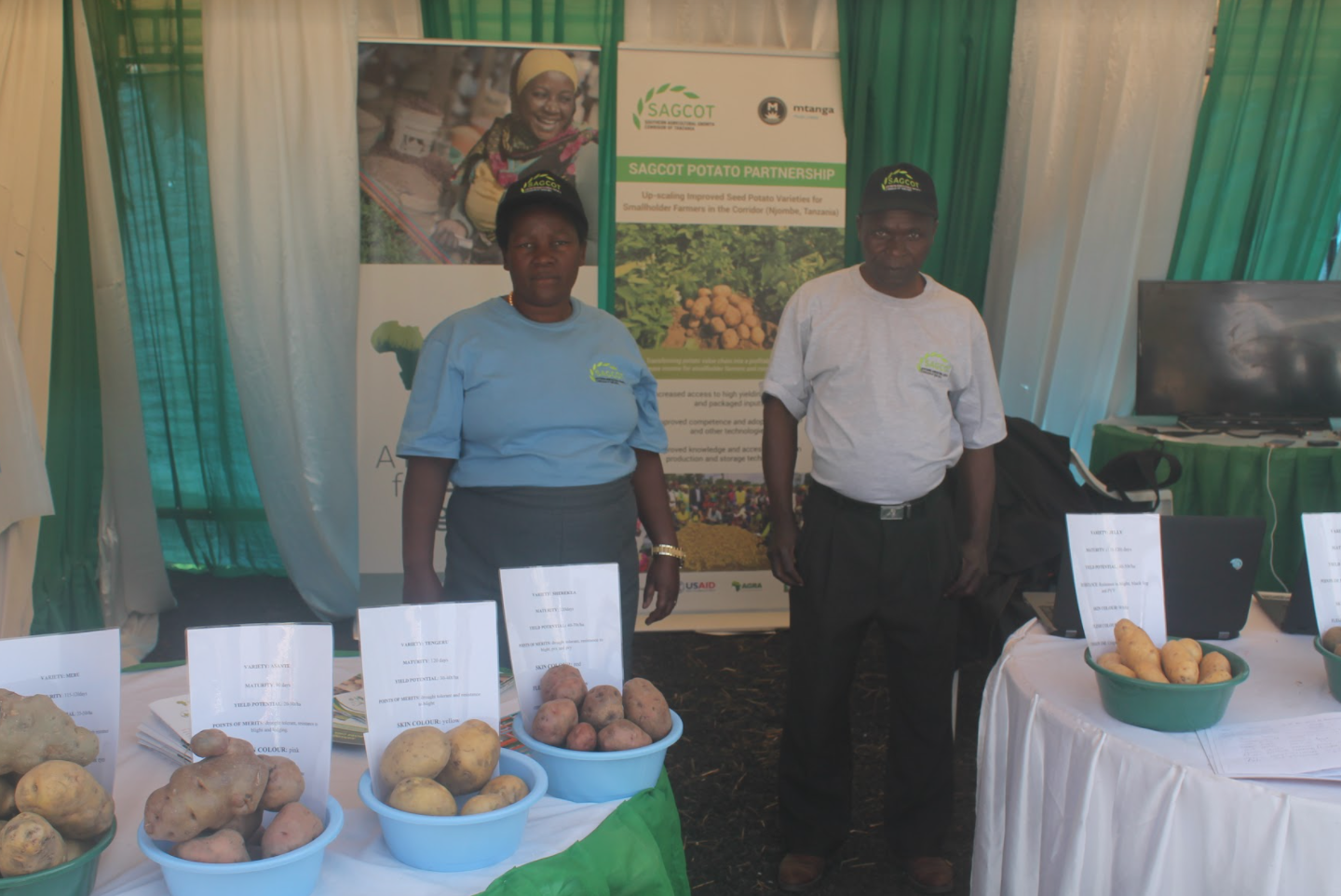By Angel Navuri
Tanzania’s president, H.E. John Pombe Magufuli is pushing the country to manufacturing and agro-processing.
For Augusta Madembwe a farmer based in Ikuna, Njombe district, Iringa region, she hopes the push by the president will reach her village. “If the government can create an environment that will enable processing of agro products at the village level, we will benefit.”
She confidently attributed her success as a farmer to the use of improved seeds, saying this has changed her into a “proud, professional farmer.” This could not have been possible without the changes
“When done the right way, farming pays. Thanks to the knowledge that I’ve gained in the last few years, on improved seeds and other available technology on my farm, I can now say I am a pro,” Augusta said.
For the third year in a row, she has been able to reap bumper harvests of potatoes and maize after using new seed varieties and fertilizers. From each acre, she now produces over 120 bags compared from before than was 35 bags.
The transformation has seen her decide to expand her farm to 12 acres this year. And she said this (farming knowledge) should have come a long time ago.
In Morogoro region, at village called Msolwa, Kilosa district, Hussein is a farmer who lives with his wife Angela and their four children Florence, Adorati and Brighton and Margaret.
Like other villages, most of her life, he has been selling his crops to middlemen who go and sell them in Dar es Salaam.
What Hussein gets from selling his crops is usually not enough to cover the school costs for his children, and he is forced to do carpentry work in the village to boost the family’s finances.
The family only owns one acre of land, and rents two more acres. But things are changing for the better. He is happy to be a beneficiary of a three-year project providing farmers with the tools and skills needed to grow new potatoes varieties, which are more suitable for the area.
In the past he used to harvest a lot of potatoes, but in the recent years, mburumundu pest has been attaching the crops in the region, which has discouraged many farmers. The new varieties that he has planted are doing fine, and he has great hopes for bountiful harvest.
Augusta and Hussein are beneficiaries of policy changes where in the recent years private companies have been allowed to multiply basic seeds, and the government has allowed many seed variety releases.
The duo are among over 1.4 million farmers in the country using new seed varieties, thanks to AGRA, which has invested more than US$51 million to support 96 agricultural development projects in the past decade in the country.
To help farmers benefit from their sweat, AGRA has been working with the government in policy reforms. Through a project called Micro Reforms for African Agribusiness (MIRA) project, has been providing the government with access to high quality technical assistance for identifying, prioritizing and reforming specific agricultural regulations.
“AGRA has been paramount in enabling a better business environment for seed trade through Micro Reforms for African Agribusiness (MIRA) project. In June this year we confirmed a new seed policy that allows private seed companies to license and produce varieties that were developed and released by public institutions,” said Tanzania Seeds Trade Association (TASTA) executive director Baldwin Shuma.
Working with the public and private sector, he notes that AGRA has made it possible the country’s smallholder farmers to get quicker access to the latest seed technology produced by researchers from government owned research institutions.
With the focus on putting farmers at the center of the country’s growing economy, AGRA has been investing in key programs along the food value chains to develop practical solutions to significantly boost farm productivity and incomes for the poor while safeguarding the environment.
SAGGOT chief executive officer Godfrey Kirenga said the new policy acknowledges that greater adoption of technology in agriculture for smallholder farmers will be an assurance of continued national food security and surplus products for the market.
According to him, grants by AGRA have played a great role in addressing the challenges small-scale farmers face across the agriculture value chain, from seeds and soils to markets, access to finance and policy.
Some of the results of the investments have been introduction of improved seed varieties, better fertilizers, post-harvest handling and storage technology for grains and innovative agricultural finance, among other outputs, he argues.
Because of the changes, Kirenga said he was very optimistic about the future of agriculture in Tanzania, and also hailed the government of Tanzania for making progress in improving agriculture policy environment to address challenges faced by stakeholders in the sector and make it easy for them to chip in.
In this, AGRA supports country-level crop breeding teams who work closely with farmers to develop new varieties suitable for local conditions. Improved seeds lift crop production providing farmers with increased food security and incomes.
The utilization of the new varieties was made possible after AGRA worked with the government to improve seed policies so that locally-owned private seed companies can access publicly released varieties for production and marketing.
End
